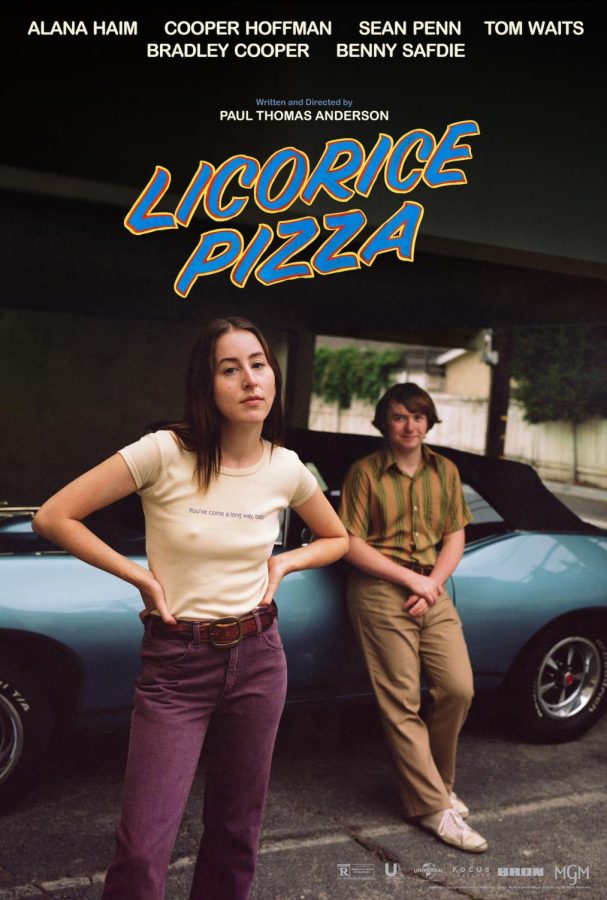“Licorice Pizza” review: Self-discovery of a twentysomething
March 17, 2022
“Do you think it’s weird that I hang out with Gary and his friends all the time?” Alana (Alana Haim) asks, as she takes a moment to contemplate how she ended up surrounding herself with a group of 15-year-old teenagers. “It’s whatever you think it is,” her sister Danielle (Danielle Haim) responds – a testament to the aimless nature of the many unfolding stories in Paul Thomas Anderson’s “Licorice Pizza.”
Set in the San Fernando Valley in 1973, “Licorice Pizza” tells the coming of age story of the twentysomething Alana. First introduced to the viewers, she meets the teenager Gary (Cooper Hoffman) at his high school. Stumbling through a mundane line that she is ushering along for picture day, the pair begin talking. Alana swings the mirror in her hand as they talk as she finds a foil of herself, someone who can put the mirror up to her and help her be. Anderson’s use of a tracking shot elongates her legs and her budding relationship with Gary, and sets a precursor to the long and winding journey that is “Licorice Pizza.”
Anderson finds magic in movement throughout the film. As Alana is in need of finding herself later than most, she finds Gary – a child actor with a rather illustrious career in minor or recurring roles, who doubles as a businessman and a socialite. Oh, and he’s fifteen. Post meet-cute, the pair enter into the high school gymnasium. After Gary asks her out on a date in which Alana asks how he would pay for it, they run into a man her age, who slaps her in the butt. After the whirlwind of a humanizing conversation with Gary, Alana becomes ultimately dehumanized walking into her job. The viewer gets slammed with the realization that Alana is floating in a world meant for her to drown, and her coming of age story is given floaties through the companionship of Gary, a grown-up teen – even through his lucrative water bed business.
Through Gary, Alana finds support. She finds purpose and a voice in a friendship, business partnership, and a will-they-won’t-they relationship where she must advocate for herself. In a town like LA, everyone is always performing, trying on different hats, and trying to see what sticks. Only the strongest succeed. Amidst the 1973 oil crisis and the failure of Gary’s water bed business, as well as life feeling like if it comes at you and not through you, Alana holds on tight. As tight as she can until she is strong enough to take the wheel herself.
Perhaps what Anderson does best in “Licorice Pizza” is letting Alana be. This is Alana Haim’s first film, and she is a natural. She reacts to the world around her, and her movement is magnetic. Both when we first meet her and well into the storyline, she is a side character in her own life until Gary’s water bed snafu with Hollywood legend Jon Peters (Bradley Cooper). In delivering and setting up the revolutionary wishy-washy water bed, things become concrete for Alana. After getting unsolicited sexual attention from Peters and having Gary and his childish friends come close to messing up a business deal, Alana has no choice but to intercede, to become independent, to take the wheel for herself. She learns to navigate rather than follow, as she skillfully maneuvers the water bed business’ truck down the dangerously winding decline of California backroads.
We root for Alana throughout the film as she comes so close to making her own moves so many times. She is always on the precipice of self-discovery with each turn she takes. Her achievement of agency is remarkable in a world of men acting like boys, and it is through a boy acting like a man that she is able to finally launch herself into life. While Gary is not responsible for her own self-reclamation, he is her support, which is something that most women in the 1970s did not have. In trying on new personalities, starting new businesses, and falling in and out of love with the wrong people, Alana becomes the main character of her own story.
“Licorice Pizza” is now available in theaters.










Grace • Mar 19, 2022 at 8:38 am
So we’re really gonna ignore the messed up age gap in the room…